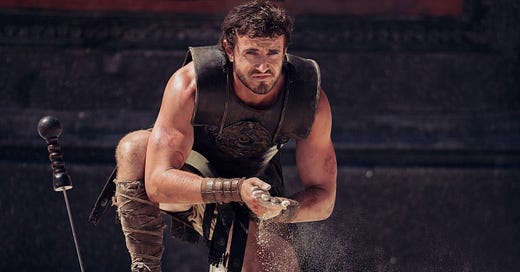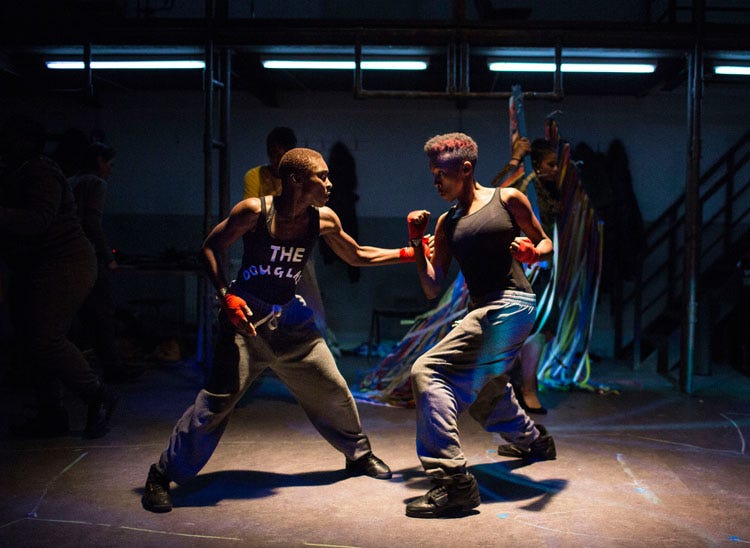Gladiator II, Dryden, and Shakespeare
[Mild Spoilers Ahead]
In Gladiator II, the hero Lucius’ identity is confirmed when he dramatically recites:
The gates of hell are open night and day / Smooth the descent, and easy is the way:
But to return, and view the cheerful skies / In this the task and mighty labour lies.
This quote about visiting the underworld is from playwright John Dryden’s 1697 translation of the Aeneid which is (mostly) in rhyming iambic pentameter. The original is in unrhymed dactylic hexameter but Dryden’s iambs “best match the original form in heft, stateliness and musicality.”1
Paul Mescal will soon play Shakespeare in the film adaptation of Maggie O’Farrell’s novel Hamnet but this current blockbuster also has a Shakespeare connection. Dryden likely wrote his translation of the Aeneid in Shakespeare’s preferred verse form of iambic pentameter because he was an absolutely enormous Shakespeare fan, unambiguously declaring: “I love Shakespeare.”2
Dryden thought that Shakespeare “was the man who of all modern, and perhaps ancient poets, had the largest and most comprehensive soul” and he adapted several of Shakespeare’s plays including Antony and Cleopatra, Troilus and Cressida,3 and The Tempest which he wrote in collaboration with playwright William Davenant.4
It is amusing that a movie that tries so hard to revive the Gladiator franchise rests extreme narrative importance on a quote about how difficult it is to come back from the dead. Repeating the success of the first Gladiator is the “task and mighty labor” of this sequel and it doesn’t quite work.
However, it is perfectly enjoyable (the Colosseum sharks are precisely as ridiculous as expected) and there are several Shakespearean actor cameos including:
Tim McInnerny as Senator Thraex. (Iago at the Globe in 2007)
Richard Katz as Governor, Baboon Arena. (Lots, currently the King of France in All’s Well at the Globe)
Quick Links
"All I could hear in my brain was [dial up sound]" –Jonathan Bailey on Othello
Remembering Kenneth Branagh’s Shakespearean Heyday (and Forgetting His Recent Lear)
What really discombobulated me, though, was that Hot Lear does such a bad job with the verse…For me, and for others in my Gen X cadre, he provided a first exhilarating experience of the Bard; the idea that Branagh might have lost his touch for [Shakespeare] feels profoundly destabilizing.
A podcast about how the Branagh Lear happened. (“Why” is an entirely separate question.)
“The [online] game space also offered that 500 year old danger of having an apple thrown at you on stage but recreated in a game [referring to the frequent shootings that took place during rehearsals].”
Ketanji Brown Jackson makes her Broadway debut in & Juliet.7
A new Shakespeare company is born! Piedmont Shakespeare Company starts performances in North Carolina this summer.
For US-based folks, the PBS documentary “Making Shakespeare: The First Folio” is available for free until the end of the month.
Highlights include a First Folio held at a Jesuit college with handwritten edits changing the female names to male for the benefit of priests-in-training (“Hostess” in Henry IV became “Host”), and a Hamlet stage manager announcing “Okay, so we’re doing the scene where everyone’s dead.”
Public Works’ Pericles will be at St. John the Divine in NYC this summer.
Charles II declares that women can perform onstage “so long as their recreations … [may be] esteemed not only harmless delight, but useful and instructive…”
I mentioned the Wolf Hall v. Man for All Seasons battle for the historical memory of Thomas More last week.8 This week, Matt Lewis makes an argument for More’s account of Richard III as a work of allegory rather than truth.
“It was suggested I openly state Richard III killed the Princes in the Tower.”
Reflections on dramaturg Morgan Jenness in American Theatre Magazine.
Morgan considered her ability to “talk truth to power” to be her greatest creative force. There is the famous story of her first encounter with Joe Papp.
Papp: “Did you just say something to me?”
Morgan: “Can the cat speak to the king?”
As Wicked mania continues apace, may we all remember Cynthia Erivo’s “The Douglas” tank top and her absolutely ridiculous arms in the Donmar’s Henry IV.
Recommendations
The Art of Legerdemain Discovered, or "How to feeme to cut ones nofe halfe off"
The current Broadway production of Our Town is cooking up eight packages of bacon a week backstage. What do do with it all? Make BLTs of course.
What’s up with the current crop (“gouge?” What is the correct collective noun here?) of Oedipi in London? Mark Strong and Lesley Manville are onstage through the new year and Rami Malek and Indira Varma take up the mantle and its pins at the end of the month.
Lise Davidsen meets the Tosca Act III Jump Box9
Richard Swinney, MD hunts wild boar with spears,10 and is The Guy to consult for “Emergency Medical Treatment of Projectile Wounds in the Late Middle Ages.”11
Dryden compares Ben Jonson to Virgil and Shakespeare to Homer so is entirely possible his translation is in debt to Jonson as well.
Troilus hilariously opens with a Prologue Spoken by Mr. Betterton, Representing the Ghost of Shakespeare: “SEE, my lov'd Britons, see your Shakespeare rise, An awfull ghost confess'd to human eyes!”
Davenant may have exceeded even Dryden in his Shakespeare fandom, frequently claiming to be Shakespeare’s secret illegitimate son.
The death of Jacobi’s character in Gladiator II has the perfunctory nature of someone who is 100% done with wearing togas and wants to make absolutely sure that he cannot possibly be asked back for Gladiator III.
The Smithsonian podcast Sidedoor has an excellent episode on the statue’s rediscovery.
She’s not the first D.C. insider to perform Shakespeare (if we’re calling & Juliet Shakespeare). Ted Cruz recited Henry V during a filibuster in 2003 and explained how the St. Crispin's Day Speech “relates to the domestic killing of Americans using drones” (He also played Reverend Parris in a law school production of The Crucible and was so hung over that he left the stage in the middle of Act III and never came back, abandoning his cast mates to improvise around his sudden departure.) Across the pond, there was an entire Fringe show about that time Boris Johnson played Richard III and absolutely refused to learn his lines.
I watched Man for All Seasons at an impressionable age and also love the Wolf Hall books. I’m comfortable with the idea that both fictional depictions of historical people and the people themselves contain(ed) multitudes. “More hath More expressed,” say I. Paul Scofield and Mark Rylance bring their long careers in Shakespeare to bear on their depictions of the Saint and both are excellent. John Hurt’s reverence for Scofield’s delivery of “but for Wales.” is deeply moving and Scofield’s Salieri calling out to his sharp old God is More-like.
I missed her Tosca but her Ariadne is *ridiculous.*
Bad news for anyone named Ancaeus. (“the slippery mass of his inner organs fell away in a pool of blood”) Today’s hunters use more modern methods.




